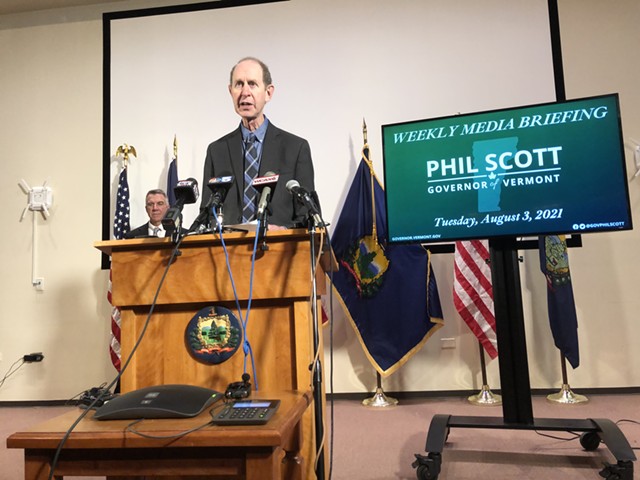
- Anne Wallace Allen ©️ Seven Days
- Health Commissioner Mark Levine
The spread of the Delta variant has driven COVID-19 case counts above last summer's figures in many areas of the state. But with the highest vaccination rate in the country and the lowest hospitalization rate, Gov. Phil Scott said Vermonters shouldn't expect new restrictions.
“While cases have picked up, it's important for Vermonters to remember we're not Florida, Louisiana, Mississippi, or any other states with significantly lower vaccination rates, and significantly higher hospitalizations,” he said. In Vermont, he added, “the data shows vaccines are preventing cases.”
That means schools are not expected to return to a remote or hybrid model this fall as people move indoors and case numbers likely rise, said Education Secretary Dan French. French said there might be some cases where a child leaves school due to individual illness and can connect online, “but the emphasis this year is going to be on in-person [instruction], because we know that works far better than the remote."
State officials are recommending that all students, teachers and staff start the school year wearing masks, and keep them on for the first two or three weeks. If at least 80 percent of the people at a school are fully vaccinated, the mask guidance would likely be lifted, but not for children under 12, for whom the shots are not yet available.
Federal rules require masks on school buses, but when it comes to other aspects of masking and education, the rules are largely up to individual districts. The Scott administration has recommended that anyone who isn’t vaccinated wear a mask in all public indoor settings.
Vermont’s high vaccination rate also means businesses shouldn’t expect to see restrictions in the fall, Scott said. But he noted the administration bases its decisions on the COVID-19 infection data.
“If we see that there's some situation that warrants us putting restrictions in place, we'll do so, but we don't see that and I don't anticipate that,” he said.
While cases are on the rise nationally and regionally, the rate of increase does seem to be slowing, said Financial Regulation Commissioner Mike Pieciak. He expects the Delta-driven COVID-19 wave to peak in the Northeast in the next couple of weeks.
There were 758 cases of COVID-19 reported in Vermont this week, a 41 percent increase over the week before. Case counts are highest by far among those who are unvaccinated. And they’re higher among those who are only partly vaccinated than among those who are fully vaccinated, Pieciak noted.
“Just a fraction” of Vermonters, or 630 out of the 418,000 who are fully vaccinated, have suffered breakthrough cases, where they tested positive for the virus despite their vaccination status, he said. He added that more than 75 percent of all Vermonters have at least started the vaccination process.
The Centers for Disease Control on Monday recommended that people whose immune systems are “compromised moderately to severely” receive an additional vaccine dose after the first two. That only applies to people who received the Moderna or Pfizer vaccines — the efficacy of another Johnson & Johnson shot hasn’t been fully tested.
The third shot will be limited to people with those conditions — about 3 percent of the adult population. They can get the injection by going to a pharmacy, medical practice or other place that offers COVID vaccines and attesting that they have a qualifying health condition.
Woven through all of the state's COVID messaging and data is the recommendation that anyone without a vaccine get one, and soon.
“The vaccine is by far the best, most effective way for you to protect yourself and your loved ones,” Scott said. “It’s the best way to make sure your kids stay in school without disruption.”
Lately, officials have also started promoting the use of masks again. Levine said he had noticed more people wearing them.
“For those not choosing to do so, please be accepting and non-judgmental toward those who do,” Levine said. “You really don't know their medical status or their personal reasons for wearing a mask. Just understand that you are actually safer because of what they're doing.”







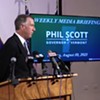

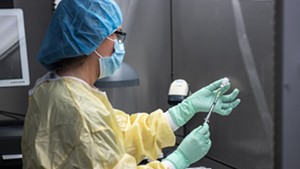

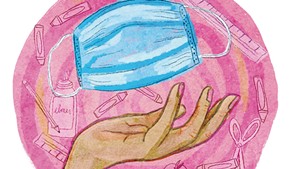
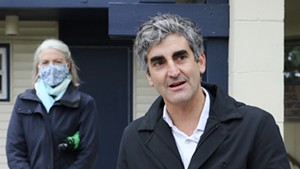




Comments
Comments are closed.
From 2014-2020, Seven Days allowed readers to comment on all stories posted on our website. While we've appreciated the suggestions and insights, right now Seven Days is prioritizing our core mission — producing high-quality, responsible local journalism — over moderating online debates between readers.
To criticize, correct or praise our reporting, please send us a letter to the editor or send us a tip. We’ll check it out and report the results.
Online comments may return when we have better tech tools for managing them. Thanks for reading.